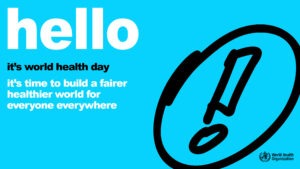April 7th of each year marks the celebration of World Health Day. From its inception at the First Health Assembly in 1948 and since taking effect in 1950, the celebration has aimed to create awareness of a specific health theme to highlight a priority area of concern for the World Health Organization.

Over the past 50 years this has brought to light important health issues such as mental health, maternal and child care, and climate change. The celebration is marked by activities which extend beyond the day itself and serves as an opportunity to focus worldwide attention on these important aspects of global health. In recent years, countries in the Western Pacific have experienced rapid economic growth, migration and urbanization. This created opportunities for better lives for many, but left others behind. The COVID-19 pandemic has undercut recent health gains, pushed more people into poverty and food insecurity, and amplified gender, social and health inequalities.
The 2021 theme is ‘Building a fairer, healthier world’ acknowledges the world’s inequalities. We must act to build better, while understanding key factors:
Our world is unequal
As COVID-19 has highlighted, some people are able to live healthier lives and have better access to health services than others – entirely due to the conditions in which they are born, grow, live, work and age. All over the world, some groups struggle to make ends meet with little daily income, have poorer housing conditions and education, fewer employment opportunities, experience greater gender inequality, and have little or no access to safe environments, clean water and air, food security and health services. This leads to unnecessary suffering, avoidable illness, and premature death. And it harms our societies and economies.
This is not only unfair: it is preventable. That’s why we are calling on leaders to ensure that everyone has living and working conditions that are conducive to good health. At the same time we urge leaders to monitor health inequities, and to ensure that all people are able to access quality health services when and where they need them. COVID-19 has hit all countries hard, but its impact has been harshest on those communities which were already vulnerable, who are more exposed to the disease, less likely to have access to quality health care services and more likely to experience adverse consequences as a result of measures implemented to contain the pandemic.
We must work together
Work hand in hand with affected communities and individuals to address the root causes of inequities and to implement solutions – within and beyond the health sector – to address them. The impact will be greatest when governments and communities work together, in a coordinated approach.

Collect reliable data
Ensure collection and use of timely and reliable health data – disaggregated by gender, age, income, education, migratory status, disability, geographic location and other characteristics relevant to the national context. Only then is it possible to assess inequities across population subgroups and take actions that have impact.
Tackle inequalities
Early childhood development in conflict-affected countries is key to life-long health, wellbeing and prosperity, says WHO and partners. Adopt whole-of-government approach to tackling the root causes of inequities and increase investment in primary health care. This is key to meeting today’s challenges of ensuring Health for All and to building the resilience of tomorrow.
Act beyond borders
Act beyond national borders. For example, only when we can protect, test and treat the whole global population can we end the COVID-19 pandemic. As well as assuring an equitable supply of vaccines, tests and treatments, we must strengthen national and international mechanisms and build community trust and participation into their delivery and uptake to ensure access for all globally.
This World Health Day campaign article was first published on the WHO site.
